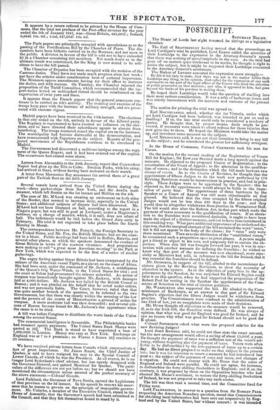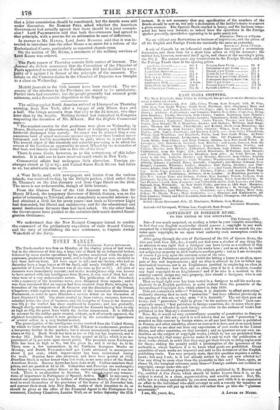POSTSCRIPT
SATURDAY NIGHT.
The House Of Lords last night resumed its sittings as a legislative chamber.
The Earl of SHAFTESBURY having moved that the proceedings on Lord Cardigan's trial be published, Lord ELnost called the attention of their Lordships to the expression in the Attorney-General's speech that there was nothing of moral turpitude in the case. As the trial had gone off on matters quite irrelevant to its merits, be thought it right to notice the subject, lest it might be supposed their Lordships concurred in the Attorney-General's sentiments.
The Bishop of LONDON censured the expression more strongly— He felt it Isis duty to state, that there was not in the matter before their Lordships any thing, in his opinion, that called for the expression of any such sentiments on the part of the legal officer of the Crown who filled the situation - of public prosecutor on that occasion ; and who, it appeared to him, had gone beyond the limits of his province in making them.
He hoped their Lordships would take the question of duelling into their most serious consideration. It was a relic of barbarous times, and was utterly inconsistent with the manners aud customs of the present day.
The motion for printing the trial was agreed to.
Earl MOUNTCASHEL asked, whether the 1st Victoria, under which act Lord Cardigan had been indicted, was intended to put an end to duelling ? If so, the late trial could only be considered a mockery of justice. He thought that, by proper means, duels might be pre- vented, if measures were taken to afford redress for those injuries that now gave rise to them. He hoped the Ministers would take the matter up, and introduce some measure on the subject.
Lord MELBOURNE said, it was not their intention to bring in any bill on the subject ; and he considered the present law sufficiently stringent.
In the House of Commons, Colonel CLEMENTS took his seat for Cavan.
On the motion for the second reading of the Registration of Voters Bill for England, Sir EDWARD SUCHEN made a long speech against the measure. He objected to the proposed Courts of Registration ; to the constitution of the Court of Appeal ; to the alteration in the qualifica- tion of voters ; and to the distinction which the bill made between two classes of voters. As to the Courts of Revision, he thought that the appointment of fifteen Judges to do the work now performed by 170 Revising Barristers would be inconvenient in practice, and bad in prin- ciple. These Judges were to be appointed by the Speaker: this he objected to, for the appointments would always be liable to the impu- tation of party bias. The appointment of three barristers by the Speaker as a Court of Appeal was still more objectionable on that ground. He believed that the time occupied by the fifteen original Judges would not be less than 230 days in the year ; and they would thus be altogether withdrawn from practice in Westminster Hall. The bill would also alter the Reform Act, in that part which made the payment of taxes necessary to the qualification of voters. If an altera- tion in the franchise were considered desirable, it ought to have been made the object of a distinct measure, and not to have been introduced in this sneaking way. What gave additional appearance of an underhand de- sign was, that the marginal abstract of the bill contained the word "taxes," but it did not appear in the body of the clause ; for " rates " only were there mentioned. Then as to the distinction of the "established voters," he considered such a proposition open to great abuses. A person might get a friend to object to his vote, and purposely fail to sustain the ob- jection. When this bill was brought forward last year, it was in con- nexion with another measure for defining the franchise : he wished to know why that part of the measure was now abandoned, more espe- cially as Ministers had said, in reference to the bill for Ireland, that it was essential the franchise should be defined.
Mr. GISBORNE, in support of the bill, alluded to the inconsistent de- cisions given by the Revising Barristers, to show the necessity of alteration in the system. As to the objection of party bias in the ap- pointments by the Speaker, he was surprised Sir Edward Sugden could raise it on this question, when he had supported the proposition of Sir Robert Peel for vesting in the Speaker the appointment of the Com- mittee of Selection in the trial of election petitions.
Mr. Weanuazois also supported the bill. He alluded to the Com- missioners of Bankrupts, as an answer to that part of Sir Edward Sugden's objection that the fifteen Judges would be withdrawn from practice. The Commissioners were confined to the administration of one kind of law, yet no complaints were made of their decisions.
Mr. HUME thought all objections to the measure would be removed,
as in the Irish bill, the franchise were defined. He was always of opinion, that what was good for England was good for Ireland, and he saw no reason why what was good for Ireland should not be good for E *gland.
Colonel SIBTHORPE asked what were the proposed salaries for the new Revising Judges?
Lord JOHN RUSSELL said, he conld not then state the exact amount, but the new arrangement would effect a saving of about 15,000/. a year. He thought the payment of rates was a sufficient test of the voter's sol- vency, without requiring also the payment of taxes. Voters were often liable to be disfranchised by the non-payment of taxes up to a certain day. He had no direct proposal to make on that subject in the present bill; but it was his intention to renew a measure he bad introduced last year en the subject of the payment of rates and taxes, and changes of o:cnpation. He could not concur with Mr. Hume that the eases of England and Ireland were parallel. He could not agree, for instance, to disfranchise the forty-shilling freeholders in England ; and if, on the contrary, it was proposed by those on the Opposition benches who had cheered Mr. Hume's sentiment, to restore the forty-shilling freeholders of Ireland, he was not prepared to take any such course.
The bill was then read a second time, and the Committee fixed for Friday next.
Lord PALMERSTON, in answer to a question from Sir ROBERT PEEL respecting the American Boundary question, stated that Commissioners for obtaining local information had been sent out respectively by Eng- land and by the United States, but' without concert : it was intended. that a joint commission should be constituted, hat the details were still under discussion. Sir ROBERT PREL asked whether the American Government had actually agreed that there should be a joint commis- sion ? Lord PALMERSTON said that both Governments had agreed to that principle, with a proviso for an arbitration in case of difference. In answer to Mr. HAWES, Lord JOHN RUSSELL said that it was in- tended to introduce into the other House a measure for a reform of the Ecclesiastical Courts, particularly as regarded church, rates. On the motion of Mr. RUNE, a statement of the military services of Lord Keane was ordered.



























 Previous page
Previous page